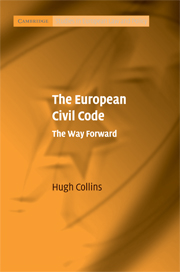Book contents
- Frontmatter
- Contents
- Preface
- Series editors' Preface
- Table of cases
- Table of treaties and legislation
- I Civil society and political union
- II The acquis communautaire in private law
- III The hidden code
- IV Private law and the Economic Constitution
- V Cultural diversity and European identity
- VI Respecting legal diversity
- VII Multi-level private law
- VIII Strengthening convergence
- IX Exploring the European Social Model
- Index
- CAMBRIDGE STUDIES IN EUROPEAN LAW AND POLICY
- References
V - Cultural diversity and European identity
Published online by Cambridge University Press: 26 February 2010
- Frontmatter
- Contents
- Preface
- Series editors' Preface
- Table of cases
- Table of treaties and legislation
- I Civil society and political union
- II The acquis communautaire in private law
- III The hidden code
- IV Private law and the Economic Constitution
- V Cultural diversity and European identity
- VI Respecting legal diversity
- VII Multi-level private law
- VIII Strengthening convergence
- IX Exploring the European Social Model
- Index
- CAMBRIDGE STUDIES IN EUROPEAN LAW AND POLICY
- References
Summary
Si c'était à refaire, je commençerais par la culture.
Jean Monnet, an inspired founder of the European Economic Community, says that if he were to receive a second chance to build Europe, he would commence with culture. If he meant that Europe should have a uniform culture, thank goodness that second chance never came. Europe's continuing splendour and attractiveness springs from its cultural diversity. From art to cuisine, from music to sport, in the whole gamut of cultural practices there is amazing energy. Through cross-fertilisation, this rich heritage breeds ever greater variety and complexity. It is vital that Europeans should conserve this endowment and continue to aid the flourishing of cultural diversity.
Even so, it is undeniable that throughout the continent of Europe certain shared values and principles are acknowledged and cherished. To quote the Treaty on European Union again:
The Union is founded on the values of respect for human dignity, freedom, democracy, equality, the rule of law and respect for human rights, including the rights of persons belonging to minorities. These values are common to the Member States in a society in which pluralism, non-discrimination, tolerance, justice, solidarity and equality between women and men prevail.
The European Union has proved rather successful in promoting these values. These rights and principles provide the essential elements of the common culture that perhaps Jean Monnet recognised was essential for his project of securing peace and prosperity.
- Type
- Chapter
- Information
- The European Civil CodeThe Way Forward, pp. 124 - 145Publisher: Cambridge University PressPrint publication year: 2008

